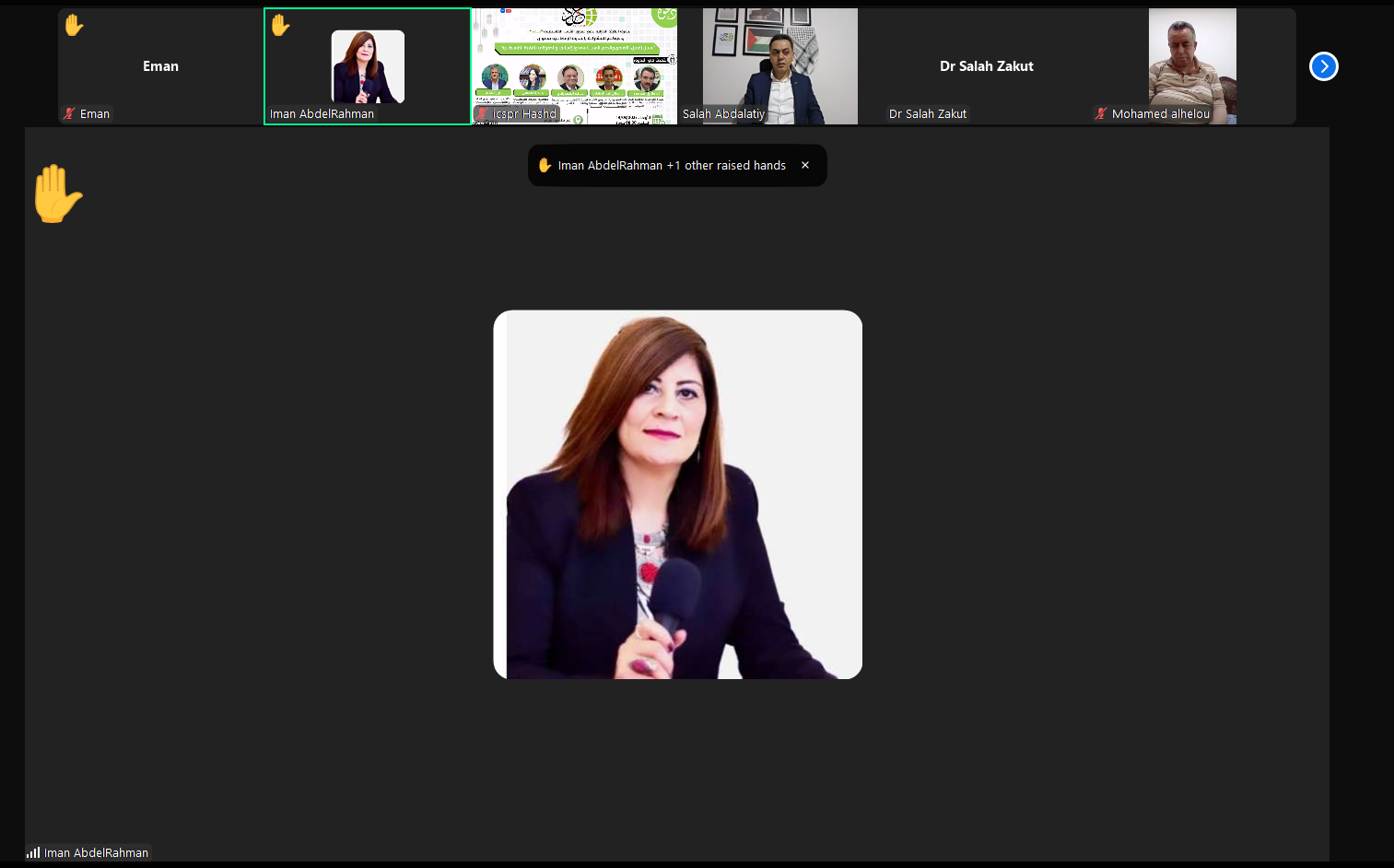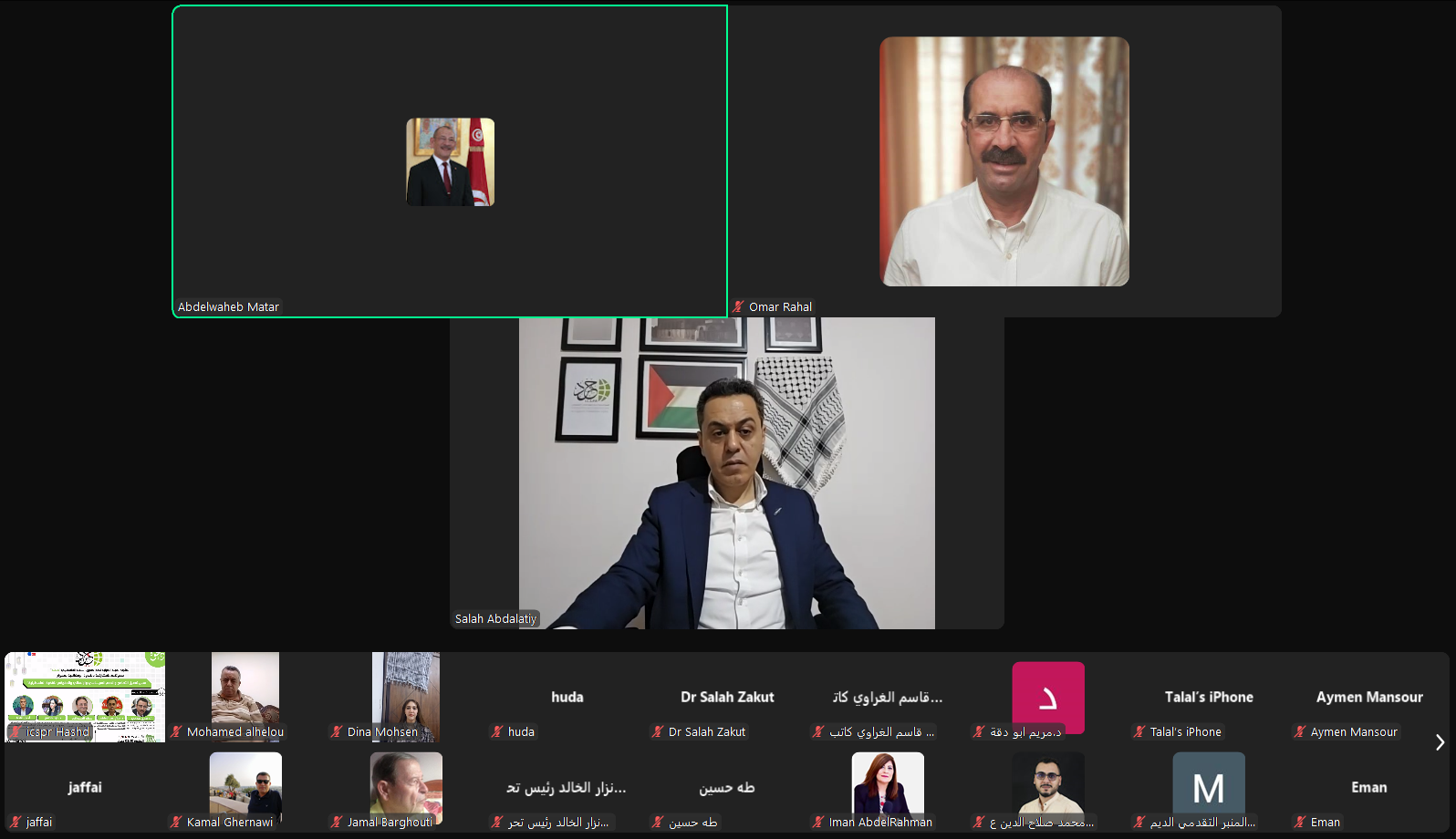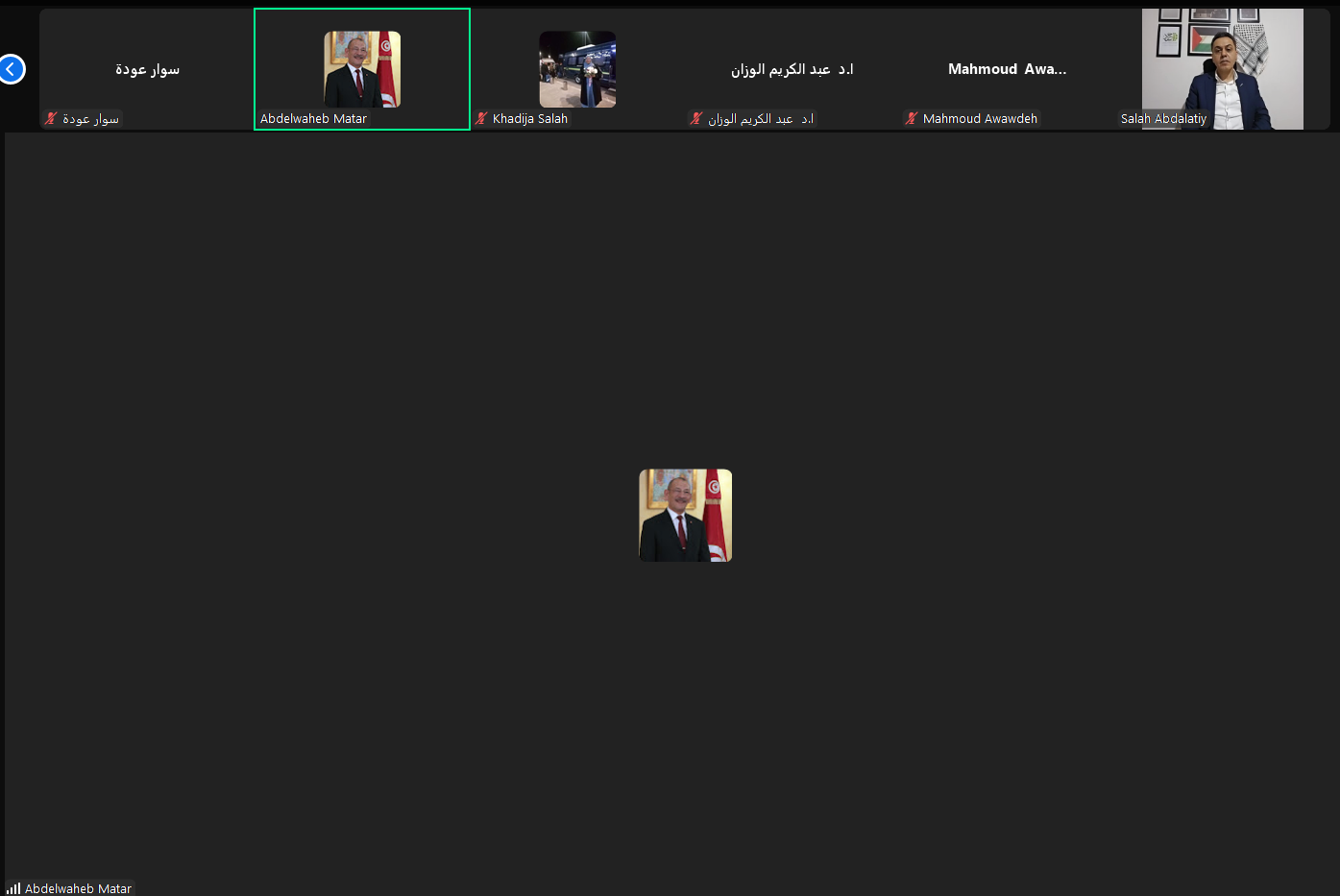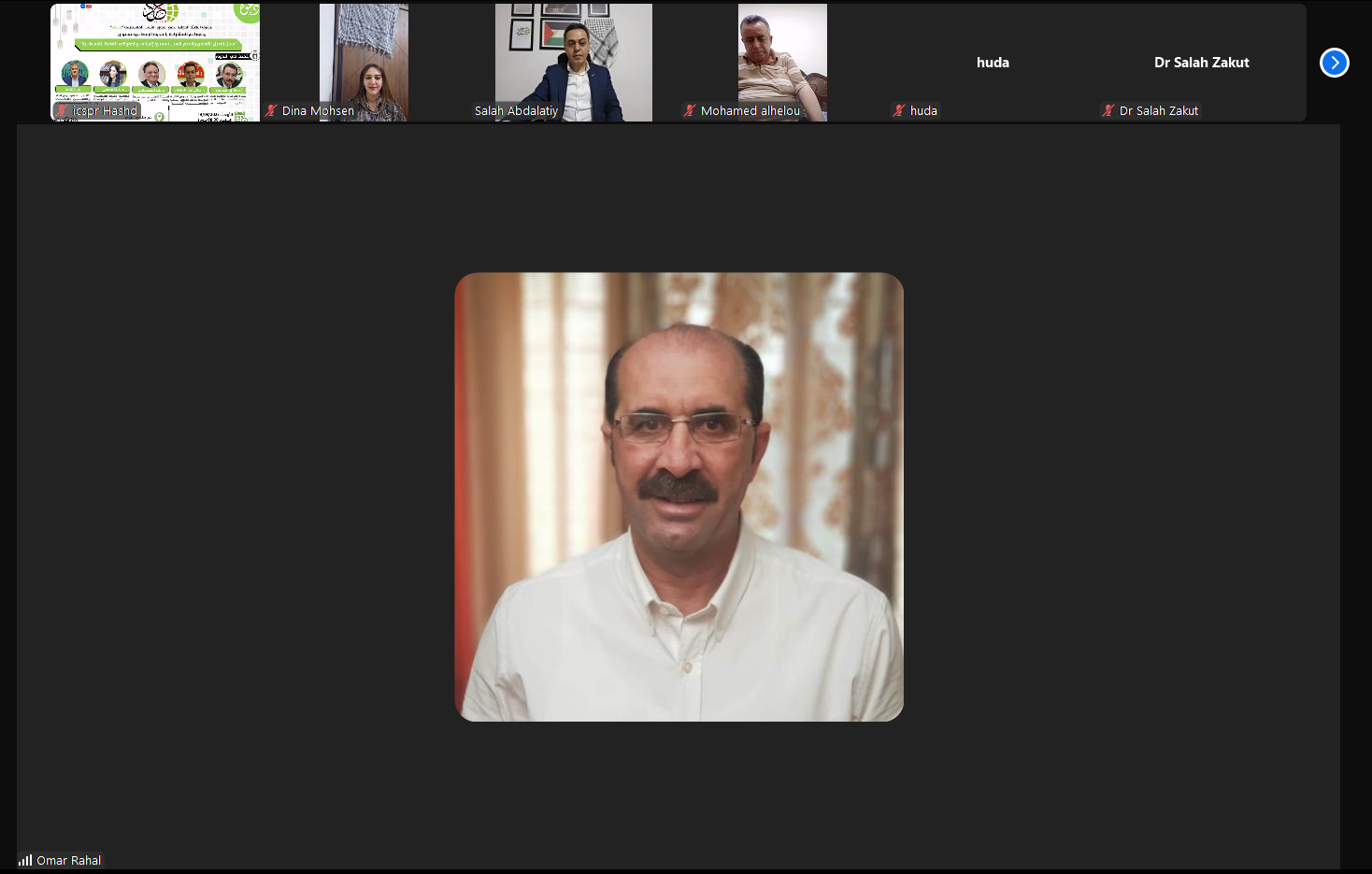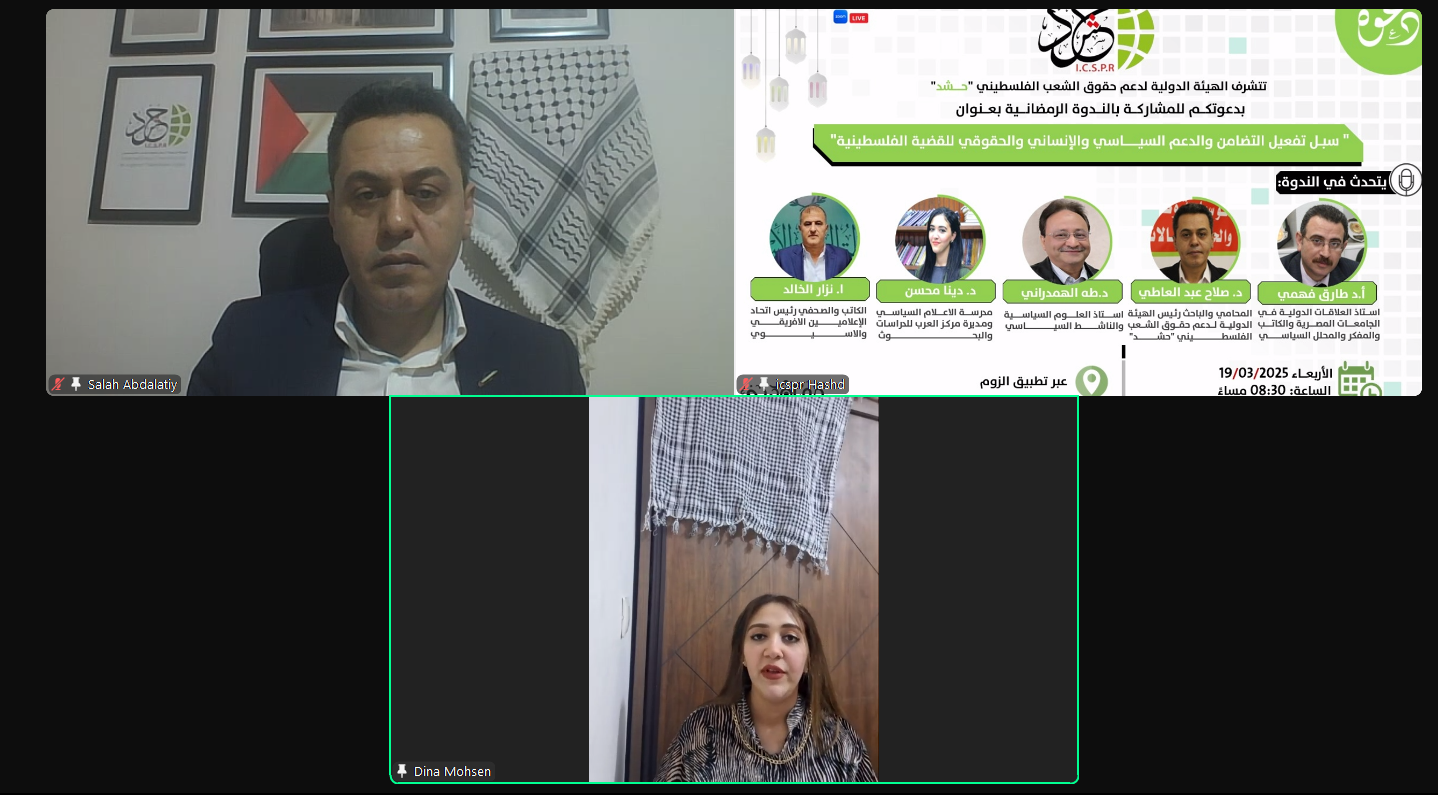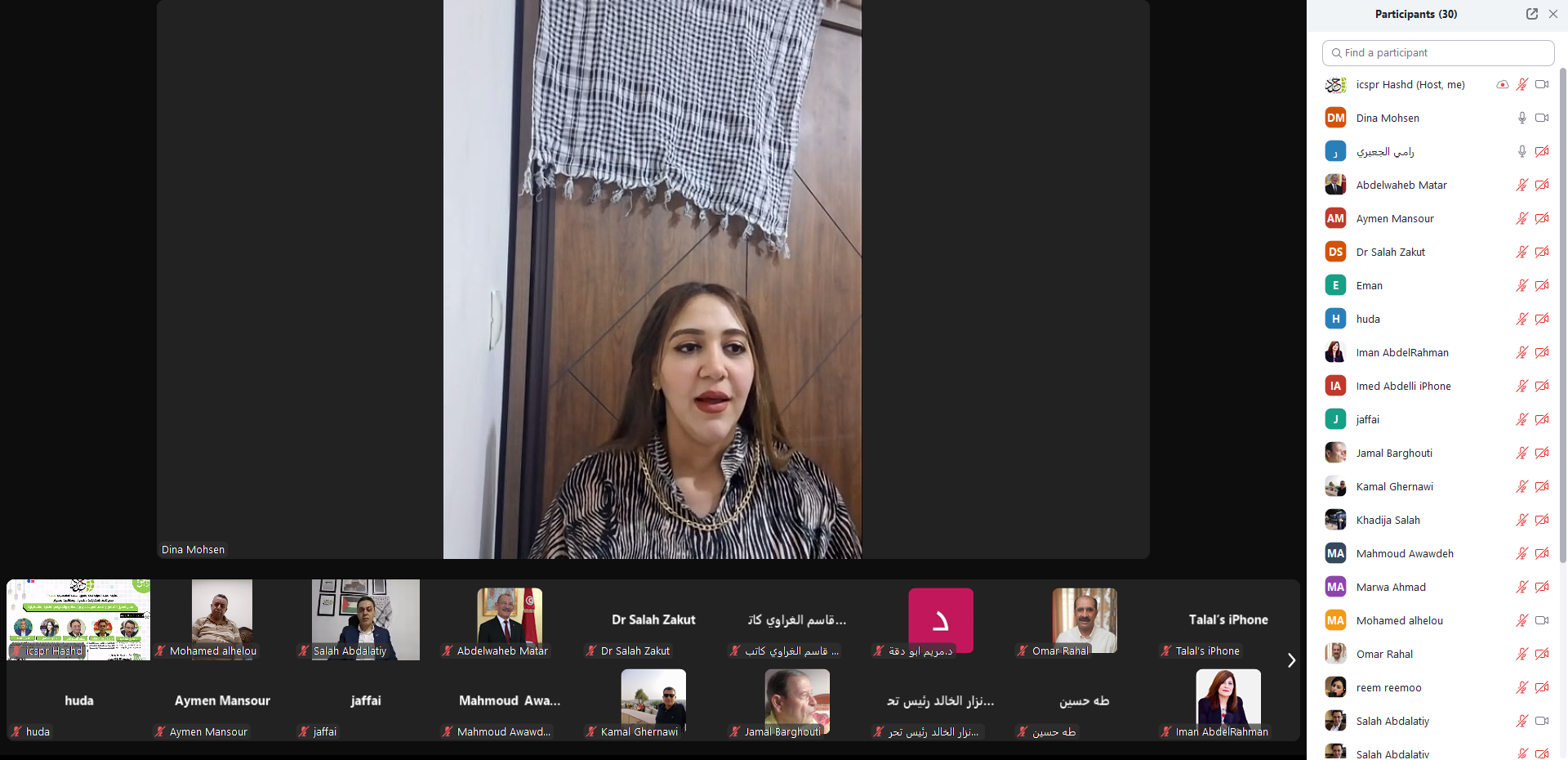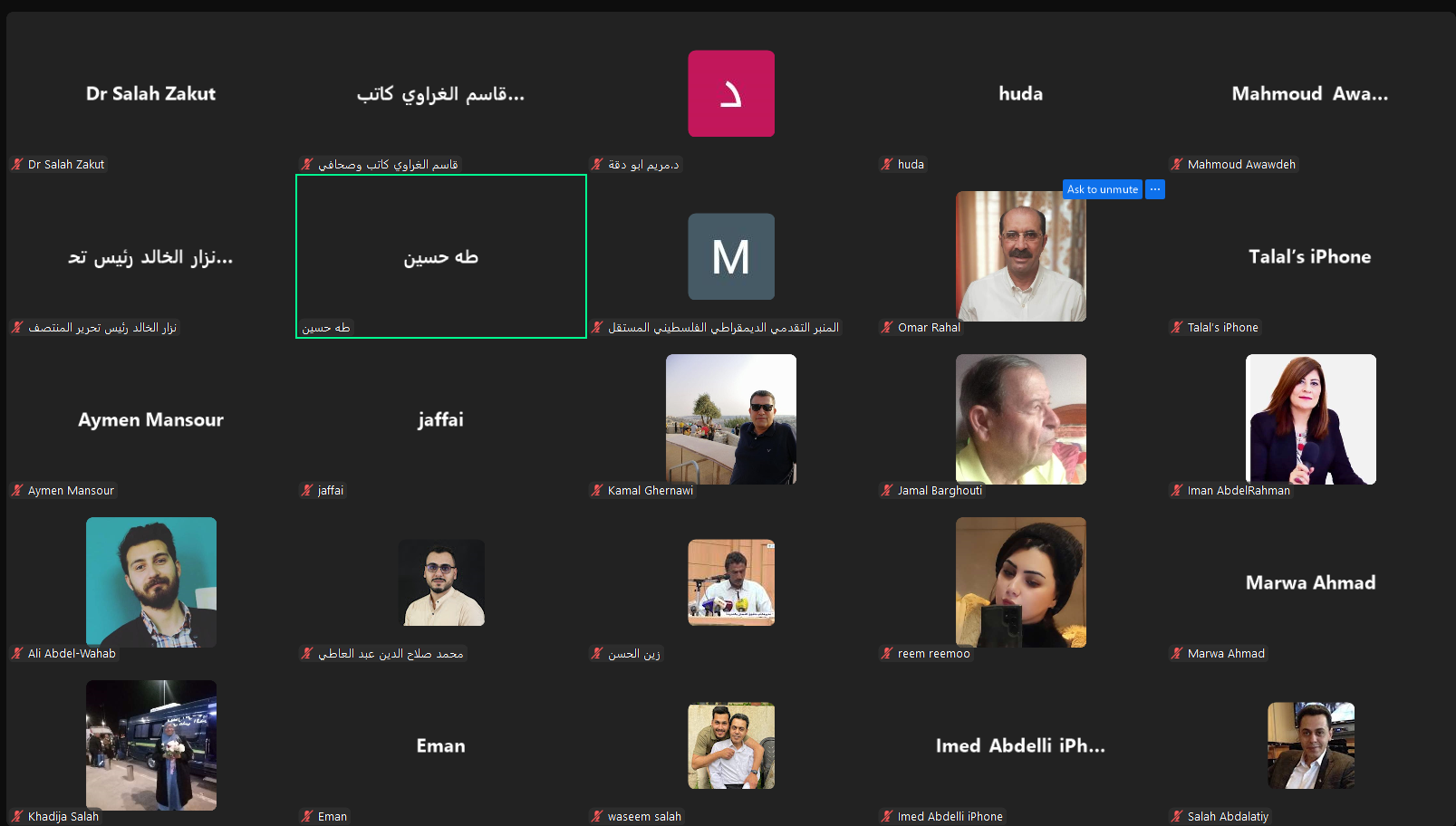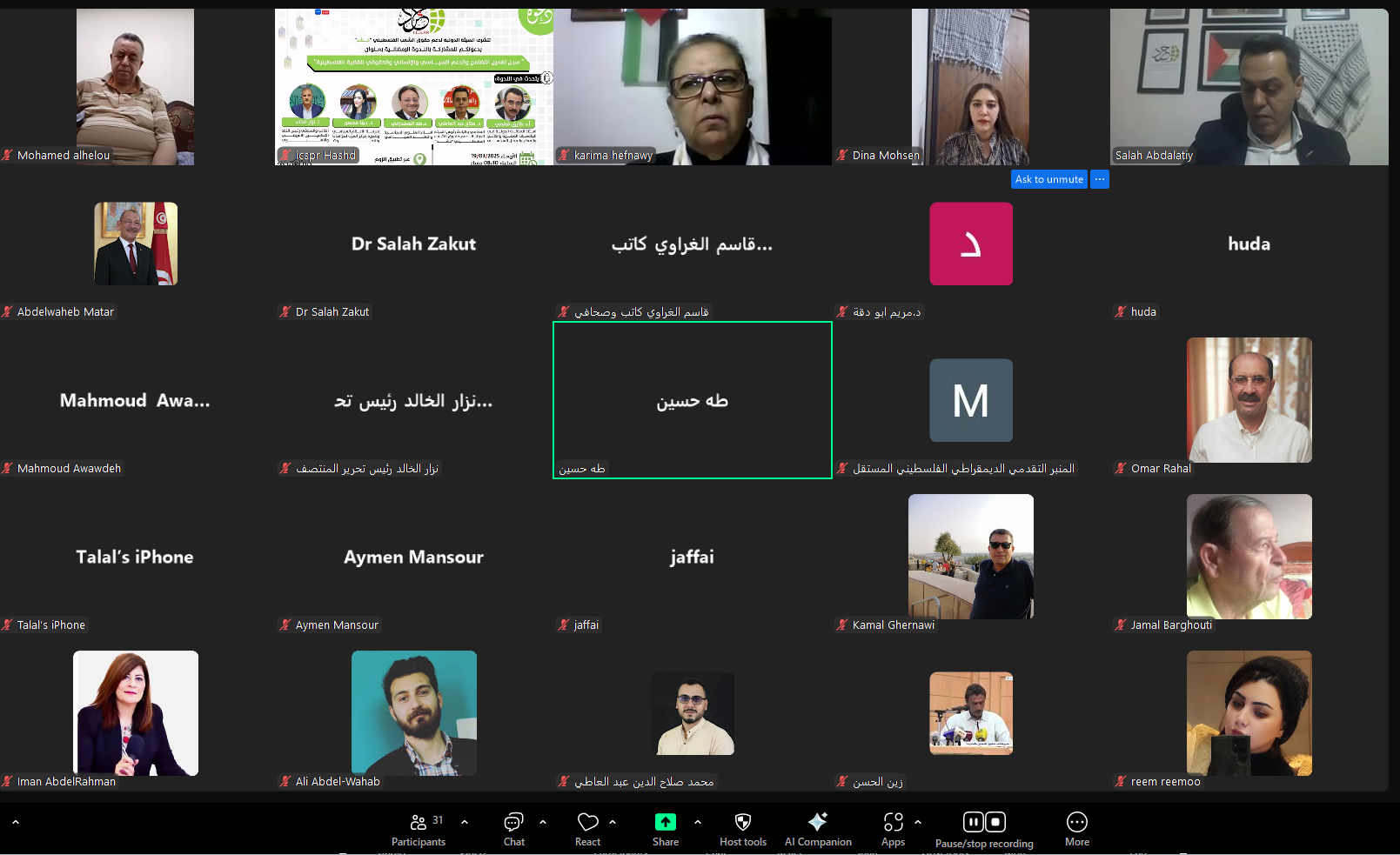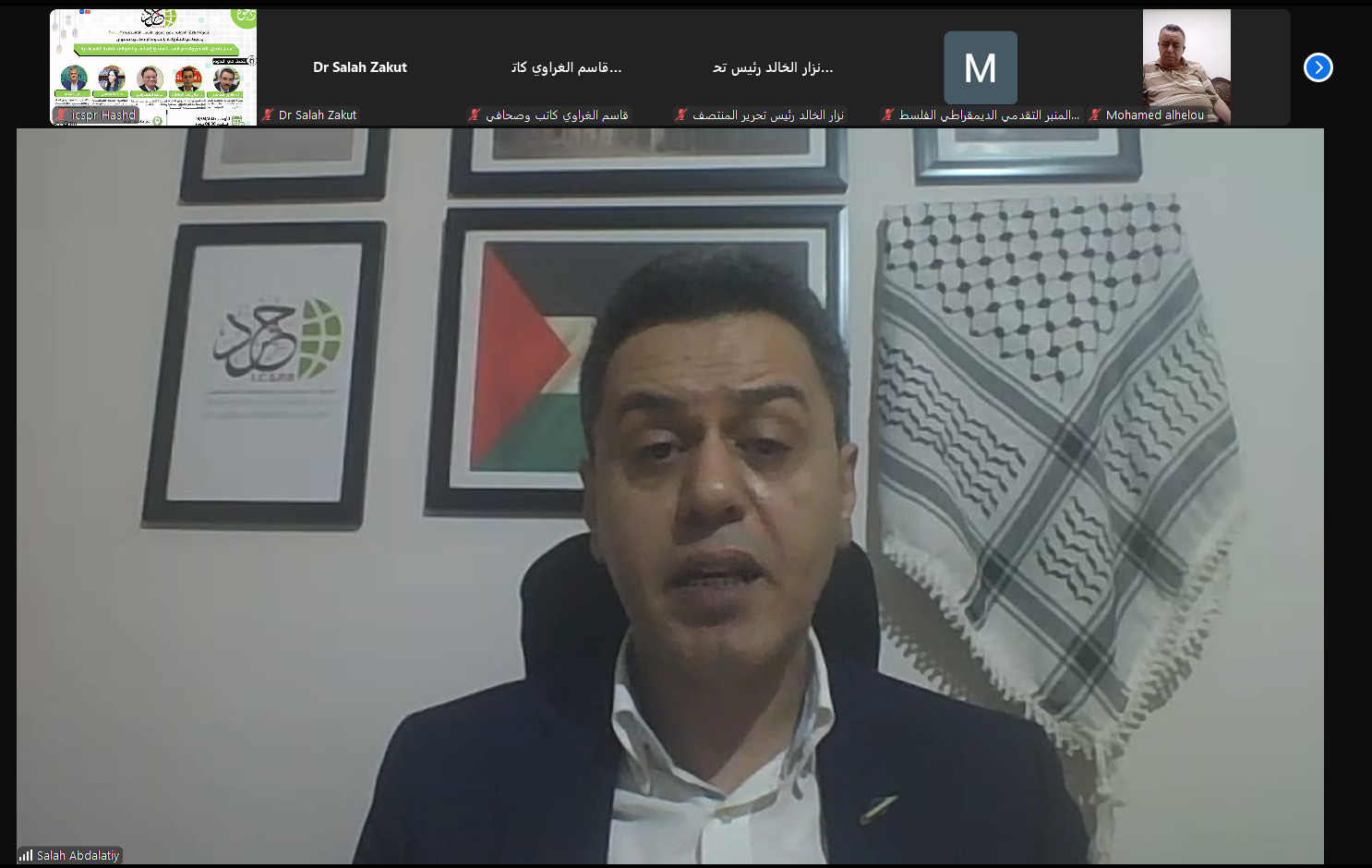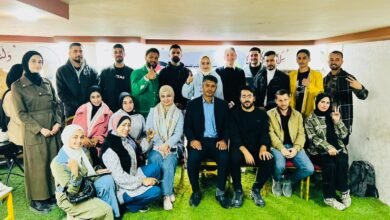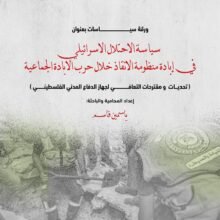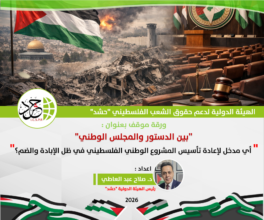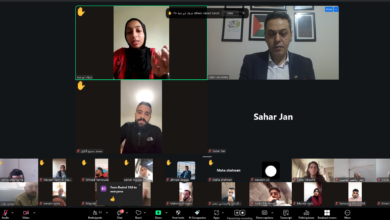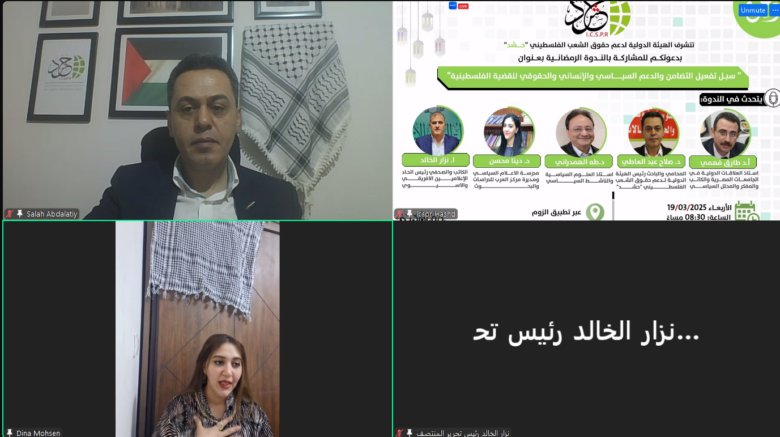
Experts Discuss Ways to Activate Solidarity and Political, Humanitarian, and Human Rights Support for the Palestinian Cause
Date: 20 Mar 2025
Press Release
Experts Discuss Ways to Activate Solidarity and Political, Humanitarian, and Human Rights Support for the Palestinian Cause
On Wednesday, March 19, 2025, the International Commission to Support Palestinian Rights (ICSPR) organized a dialogue session via the Zoom platform titled: “Ways to Activate Solidarity and Political, Humanitarian, and Human Rights Support for the Palestinian Cause.” The session included representatives from governmental and civil society institutions, political forces, and a distinguished group of experts and specialists on Palestinian affairs. This meeting took place amidst the ongoing Israeli aggression on the Gaza Strip, which has resulted in the death of more than 420 martyrs, including 170 children and 120 women, during the holy month of Ramadan.
Abdel Aati welcomed the participants, appreciating their efforts in defending the Palestinian cause. He highlighted the latest developments and events affecting Palestine amidst the ongoing genocidal war, which has expanded to include the West Bank. He reviewed the final statistics on the number of killed, wounded, missing, and detained individuals, describing the crimes of genocide, colonial annexation plans, forced displacement, and siege as a systematic violation of international conventions and humanitarian law. He called this a dark chapter in human history, exposing the world’s inability to stop genocide and ethnic cleansing while Israel continues to evade international law and UN resolutions related to the Palestinian cause.
He added:
*”Since October 7, Israel has been waging an 11-month-long genocidal war against Gaza and the Palestinian people. During this period, Israeli occupation forces have committed war crimes, crimes against humanity, and acts of genocide, deliberately targeting civilians, especially children, women, journalists, medical teams, and humanitarian workers. The occupation has killed nearly *65,000 martyrs and missing persons, wounded over 113,000 individuals, 70% of whom are children and women, and arrested around 13,000 prisoners, of whom 6,500 remain in detention and have been subjected to brutal torture, assaults, and sexual violence. About 64 detainees have died inside Israeli prisons due to torture and medical neglect.”
Regarding violations in the West Bank, Abdel Aati stated:
“In the West Bank and Jerusalem, Israeli occupation forces and settler militias continue their crimes of assaulting civilians and their properties, executing Palestinians in cold blood, storming and destroying refugee camps and cities, displacing their residents, expanding illegal settlements, annexing Palestinian lands, storming Al-Aqsa Mosque, demolishing homes, and imposing military checkpoints.”
Abdel Aati emphasized that for 76 years, Israel has been implementing policies and actions rooted in racial discrimination against the Palestinian people. He highlighted how the Israeli occupation has systematically violated international conventions and humanitarian law in its administration of the occupied Palestinian territories and its dealings with the civilian population, persistently denying Palestinian rights and evading international legal obligations.
He reiterated:
“Since October 7, the Israeli genocidal war against Gaza has continued for 11 months, during which war crimes, crimes against humanity, and acts of genocide have been committed. The Israeli occupation has killed nearly 65,000 martyrs and missing persons, wounded over 113,000 individuals—70% of whom are children and women—arrested around 13,000 prisoners, of whom 6,500 remain detained and have been subjected to torture, brutal assaults, and sexual violence, leading to the deaths of about 64 prisoners due to torture and medical neglect.”
Abdel Aati further noted:
“Israeli airstrikes and the excessive, illegal, and disproportionate use of force—deploying nearly 100,000 tons of explosives—have destroyed 85% of homes, buildings, infrastructure, service facilities, economic institutions, and agricultural lands in Gaza. The occupation has imposed collective punishments, including cutting electricity, closing border crossings, and obstructing humanitarian aid deliveries, exacerbating the catastrophic humanitarian crisis in Gaza. The horrifying siege has left Gazans facing death by bombardment, bullets, starvation, disease, and thirst, reinforcing the Israeli policy of genocide and ruthless collective punishment. Israel’s actions are not just violations of international laws but a barbaric affront to human civilization.“
He called on governments and organizations to fulfill their legal and ethical responsibilities by working to stop the Israeli aggression and genocide, ensuring the flow of humanitarian aid and medical supplies, and providing international protection for Palestinians. He urged the boycott and isolation of Israel and the imposition of sanctions on it, while also supporting legal efforts to prosecute Israeli leaders and soldiers before international courts. Abdel Aati stressed the need to activate international humanitarian intervention mechanisms to address the unprecedented humanitarian catastrophe in Gaza.
Nizar Khaled, journalist and editor-in-chief of Al-Muntasaf newspaper, emphasized that the Palestinian cause remains one of the most pressing global justice and self-determination issues, requiring unified international solidarity. He called on the global community to support the Palestinian people politically and humanitarianly to ensure their legitimate rights. Khaled also stressed the need for Arab and Islamic nations, along with human rights organizations, to step up their aid efforts and strengthen diplomatic and legal measures against the Israeli occupation.
He concluded by stating:
“Today’s battle is not only military but also media, diplomatic, and legal. This necessitates coordinated efforts to isolate Israel internationally, boycott its institutions, and expose its war crimes in all global forums.”
For his part, Dr. Taha Al-Hamdali, professor of political science and Yemeni political activist, affirmed that solidarity with the Palestinian people is a national, moral, and religious duty. He stressed that the political efforts made so far have not risen to the level of protecting the Palestinian people from the crimes of the occupation. He called for the adoption of a unified national strategy aimed at gaining international support and setting aside internal divisions. Additionally, he emphasized the need to review and develop Palestinian performance, particularly concerning the work of embassies and diplomatic missions abroad, to maximize political and diplomatic engagement with the occupation across international platforms. He also pointed out that the United Nations has proven its inability to take effective measures to stop Israeli aggression, given the continuous U.S. support for the occupation, which necessitates intensifying diplomatic and grassroots efforts to impose international sanctions.
Dr. Dunia Mohsen, professor of political media and director of the Arab Center for Studies and Research, emphasized the importance of cultural and media support in serving the Palestinian cause, noting that the media battle is no less significant than the battlefield. She called for the development of digital public diplomacy through culture and the arts to convey the Palestinian narrative to the world and counter attempts to erase Palestinian identity. Additionally, she stressed the importance of diversifying Palestinian media production and using multiple platforms in global languages, including content aimed at European and American public opinion, to highlight Palestinian suffering and combat Israeli propaganda.
Dr. Omar Rahhal, director of the Shams Center for Human Rights Studies, praised the meeting for its goal of mobilizing activists, civil society, and grassroots diplomacy to pressure governments to impose sanctions on Israel and recognize the State of Palestine. He called for the formation of a preparatory committee to work on the international level, with a focus on using social media in European languages to create public support for the Palestinian cause. He also emphasized the importance of supporting the global Boycott, Divestment, and Sanctions (BDS) movement and strengthening ties with Palestinian and Arab communities abroad. Additionally, he called for launching a large-scale Palestinian campaign to boycott Israeli products and promote national products.
Dr. Abdel Wahab Matar, former Tunisian minister and political activist, noted that global changes, especially following Donald Trump’s presidency in the United States, necessitate re-evaluating outdated mechanisms for dealing with the Palestinian cause. He stressed the need to develop new strategies that align with current challenges, including reshaping the Palestinian discourse to communicate effectively with global public opinion and intensifying diplomatic efforts in international forums to isolate Israel politically and legally. He also emphasized the importance of confronting normalization in the Arab region and strengthening collaboration with anti-normalization movements in the Gulf and beyond.
Dr. Mariam Abu Daqa highlighted that Gaza is a gateway for Israel’s control over neighboring Arab states. She asserted that Palestinian unity is the foundation for confronting the occupation. She called for activating the role of media and digital diplomacy to convey the Palestinian narrative to the world, with a focus on exposing the risks associated with security and technological cooperation between Arab countries and Israel. She also urged the adoption of a sustainable media strategy, ensuring that media campaigns in support of Palestine are not limited to times of crisis but are maintained throughout the year.
Dr. Karima Hafnawi, an Egyptian political activist, called for the formation of a legal, grassroots, and media committee to raise awareness about the Palestinian cause. She urged the organization of global online protests on international occasions to pressure Israel and stop the aggression. She also stressed the importance of building alliances with labor unions and human rights movements worldwide to enhance grassroots support for the Palestinian cause. Hafnawi noted that popular solidarity is more impactful than official support and should be actively utilized at this time.
Dr. Qasim Al-Gharawi affirmed that grassroots solidarity is the most powerful weapon in confronting the Israeli occupation. He pointed out that international boycott movements have successfully imposed economic and cultural isolation on Israel. He called for activating the role of Palestinian and Arab communities abroad to pressure their governments into taking a firmer stance against the occupation. Additionally, he emphasized the importance of building global support networks for Palestinian grassroots resistance.
Palestinian activist Dr. Salah Zaqout, based in Europe, called for the formation of a preparatory committee to engage with Arab governments to unify the Palestinian position. He highlighted that over 49,000 pro-Palestinian events have taken place in the Western world, underscoring the need to replicate such activism in the Arab world and enhance public engagement with the Palestinian cause. He stressed the necessity of activating international advocacy mechanisms for Palestine and institutionalizing the global solidarity movement to counter the obstacles imposed by the occupation.
The participants called for a unified Palestinian and Arab stance to serve as a bulwark against genocide, colonial annexation plans, forced displacement, and the starvation of Palestinians. They urged the adoption of a unified national strategy aimed at gaining international support, setting aside internal disputes, and reviewing Palestinian performance—particularly regarding the work of embassies and diplomatic missions abroad—to strengthen official and grassroots political, diplomatic, and legal engagement with the occupation across all international platforms and organizations. This would support efforts to boycott, isolate, and prosecute the occupation.
They also demanded the activation of solidarity movements and the engagement of Palestinian and Arab communities abroad in the boycott movement. They called for strengthening relations with all supporters of the Palestinian cause, regardless of their affiliations, and coordinating with them to bolster Palestinian solidarity efforts and the boycott movement. Furthermore, they called for launching advocacy campaigns to pressure governments to fulfill their role in protecting civilians and stopping Israeli crimes.
The participants also emphasized the need to expand grassroots resistance against genocide and strengthen support for the Palestinian cause. They called for focusing on the media’s role and enhancing Palestinian media production, urging artists, media production companies, and Arab satellite channels to expose Israeli crimes and adopt sustained media campaigns in support of Palestine, rather than limiting such campaigns to specific occasions.
Given the critical circumstances, the participants urged a review of Arab-Israeli and Arab-American relations and an end to normalization with Israel. They called for, at the very least, adherence to the Arab Peace Initiative agreed upon at the 2002 Beirut Summit. Additionally, they urged Arab civil society organizations to exert pressure on their governments to boycott Israel, labeling it as a state engaged in organized terrorism, and to implement comprehensive boycott measures.
The participants also demanded the establishment of a grassroots humanitarian support fund and the formation of a committee to strengthen the solidarity movement as an active front in the struggle for Palestinian national rights. They emphasized the importance of building popular, trade union, and civil alliances, focusing on practical and implementable steps, and mobilizing the millions who believe in the justice of the Palestinian cause. These individuals should be encouraged to participate in the boycott movement, isolate the occupation, withdraw investments, and impose sanctions. However, this effort requires further support and the activation of international advocacy mechanisms for the Palestinian cause. There must also be extensive efforts to institutionalize the international solidarity movement to counter the barriers and obstacles imposed by the occupation authorities.
• Intensifying Arab diplomatic efforts to stop the aggression against the Gaza Strip, activating the role of international and Arab institutions in supporting the Palestinian cause, and activating the role of the Arab League by urgently moving to European capitals to exert more pressure on Israel.
The participants called for the formation of a follow-up committee to exert pressure for the unity of the Palestinian position and to develop the Arab stance in confronting the decisions of “Donald Trump” and the Israeli occupation.
• Establishing a popular fund to support Palestinian civil society organizations and contribute to providing humanitarian aid to the Gaza Strip.
The participants valued the role of the International Commission to Support Palestinian Rights and human rights organizations in documenting Israeli human rights violations and prosecuting those responsible before international courts.
The participants called for activating the role of media and culture in supporting the Palestinian cause and raising international public awareness of the Palestinian people’s rights.
• Developing digital popular diplomacy through culture and the arts.
• Using social media in European languages to create public opinion in support of the Palestinian cause.
• Activating the role of media in promoting the Palestinian narrative through digital diplomacy and media activists.
• Organizing events and activities to support popular solidarity with the Palestinian cause.
• Activating popular demonstrations and mass events in Arab countries to pressure governments.
• Organizing global electronic demonstrations on specific international occasions to pressure for stopping the aggression, ending the occupation, and highlighting the Palestinian narrative.
The participants stressed the necessity of achieving Palestinian unity and ending the division to confront the challenges facing the Palestinian cause.
The participants called for activating solidarity committees and forming a coalition to coordinate solidarity efforts and work at the international level in support of the Palestinian cause, including legal, popular, and media committees to raise awareness about the Palestinian cause.
Conclusion:
The participants called for a review of Arab, Israeli, and American relations and for halting normalization with the Israeli occupation. They emphasized the importance of respecting the Arab Peace Initiative, which was unanimously agreed upon by Arab states at the Beirut Summit in 2002. They also urged Arab civil society organizations in all their forms to engage in pressure campaigns on their governments to boycott the Israeli occupation, considering it a state that practices organized terrorism.


